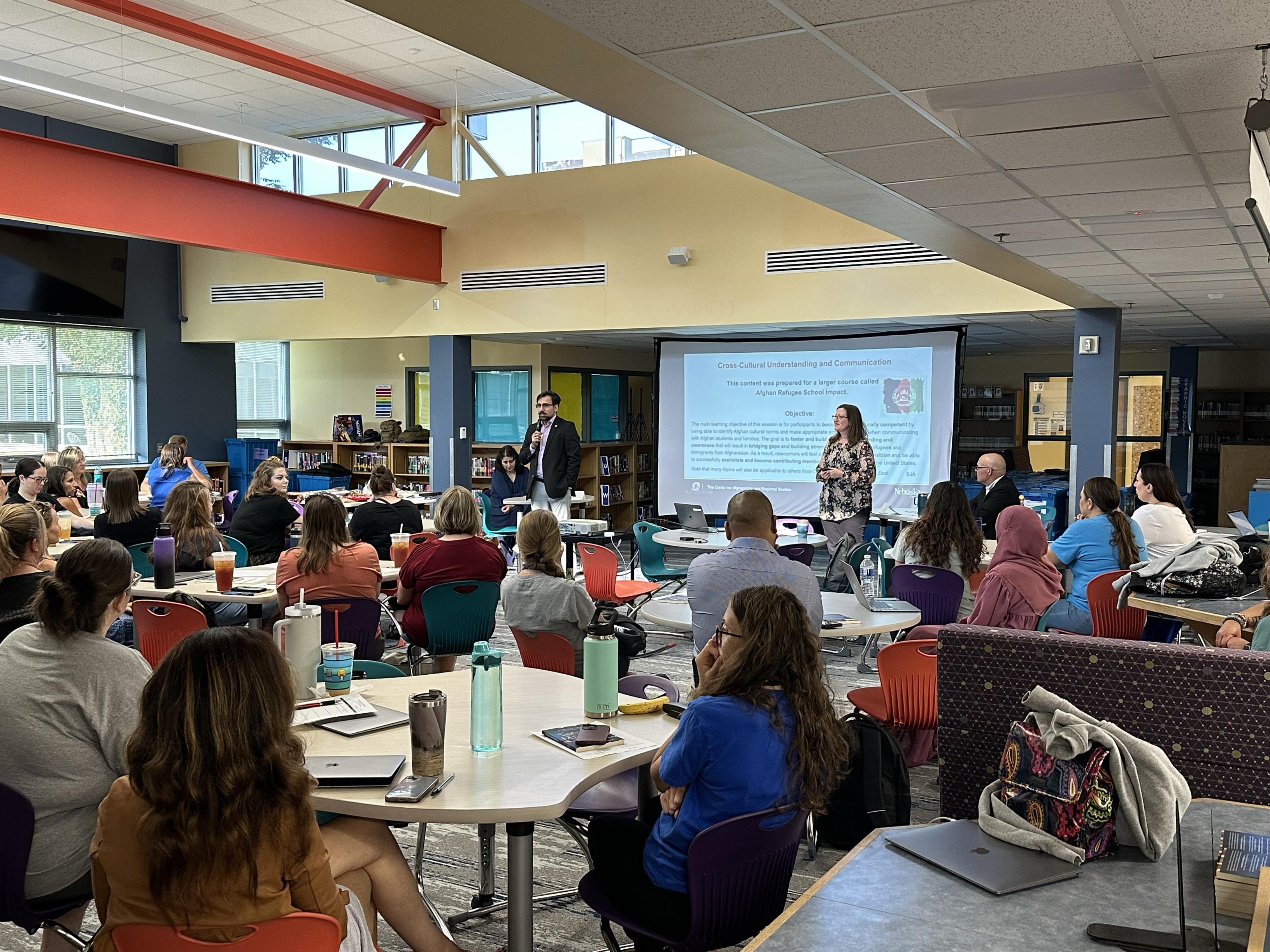Afghan Refugee School Impact Course and Seminars
Opportunity for Educators Working with Newcomers from Afghanistan and Beyond
History and Development of the Course
The Center for Afghanistan and Regional Studies is proud to have had the opportunity to implement the Afghanistan Refugee School Impact Course to serve our community by supporting local school districts as they are working closely with newcomer students and families from Afghanistan and other countries.
The Afghan Refugees School Impact Course was developed at the request and funds from the Nebraska Department of Education who needed professional development training to address the growing number of newcomers from Afghanistan after the 2021 Taliban takeover in Afghanistan and the subsequent resettling of Afghans in Nebraska and other parts of the U.S. The course was launched in October 2023 with participants from Omaha Public Schools, Millard Public Schools, and Lincoln Public Schools. As a result of the success of the course and the need to reach larger audiences of educators, additional professional development seminars were conducted in June and July of 2024. Another class was launched for Gretna and Elkhorn schools in October 2024 as well as a fall seminar with Lincoln Federal Programs personnel. A total of 300 educators have benefited from either the class or seminars since the fall of 2023.
Course Impacts
Many gaps between schools and Afghans have been bridged. This course helps to facilitate the successful integration of Afghan refugees into U.S. school systems. The course provides educators with an environment where they can ask questions and, at the same time, become more aware of their own culture. The impact is broad because the course material can be applied to refugees and immigrants from other places, not only Afghanistan. Many topics are discussed and ideas for solutions come to the surface regarding cross-cultural understanding, health and well-being, and religious practices. Educators share what they learn with others in their schools and communities, creating a trickle-down effect. The lifetime of cross-cultural experiences, life-stories, and diversity of The Center’s team Sher Jan Ahmadzai, Robert Holbert, Soraya Rahmanzai, and Charity Stahl, gives the course an authenticity that is not easily matched or found elsewhere. The impacts can be seen clearly in the quotes below from Nebraska course participants.
Quotes from Participants
“I am very glad that I had the opportunity to do this course. I have learned so much and now I can better understand who I am teaching. I love sharing with Afghan families every day and getting to know all about their culture.”
“It has been very helpful and I especially appreciated hearing personal stories from the presenters.”
"I would recommend this course to the school principal, counselors ,and ELL teachers because it is such a rich and informative insight. I would like to have more of my colleagues involved with this professional development.”
The Course
The hybrid course is hosted online using NU Advance. Material is presented in a variety of avenues including in-person sessions, videos, supplemental materials, recommended readings, interactive discussion boards, and Zoom meetings. Participants who complete the requirements of the course receive a certificate of completion and a microcredential.
The Program Framework: The 5 Modules
- Module 1: The Refugee Experience
- Module 2: Cross-cultural Understanding and Communication
- Module 3: The People of Afghanistan
- Module 4: Religious Practices of Afghans
- Module 5: Professional Skills for Supporting English Language Learners (ELLs) and ELLs with Disabilities
Course Competencies:
- Improved knowledge about tools to support the learning and acculturation process for refugee students as they become growing participators in the new culture and new language
- Strengthened pedagogical skills for supporting English language learners
- Increased awareness of the refugee experience and the core stressors and effects of displacement, trauma, acculturation, resettlement, and isolation
- Enhanced cross-cultural awareness and communication skills especially related to Afghan people, and motivation towards personal growth in cross-cultural competence
- Bolstered skills and innovative ideas for creating welcoming schools and classrooms for Afghan newcomers
- Increased empathy towards those living through the refugee experience, and adeptness to support refugee students and families
